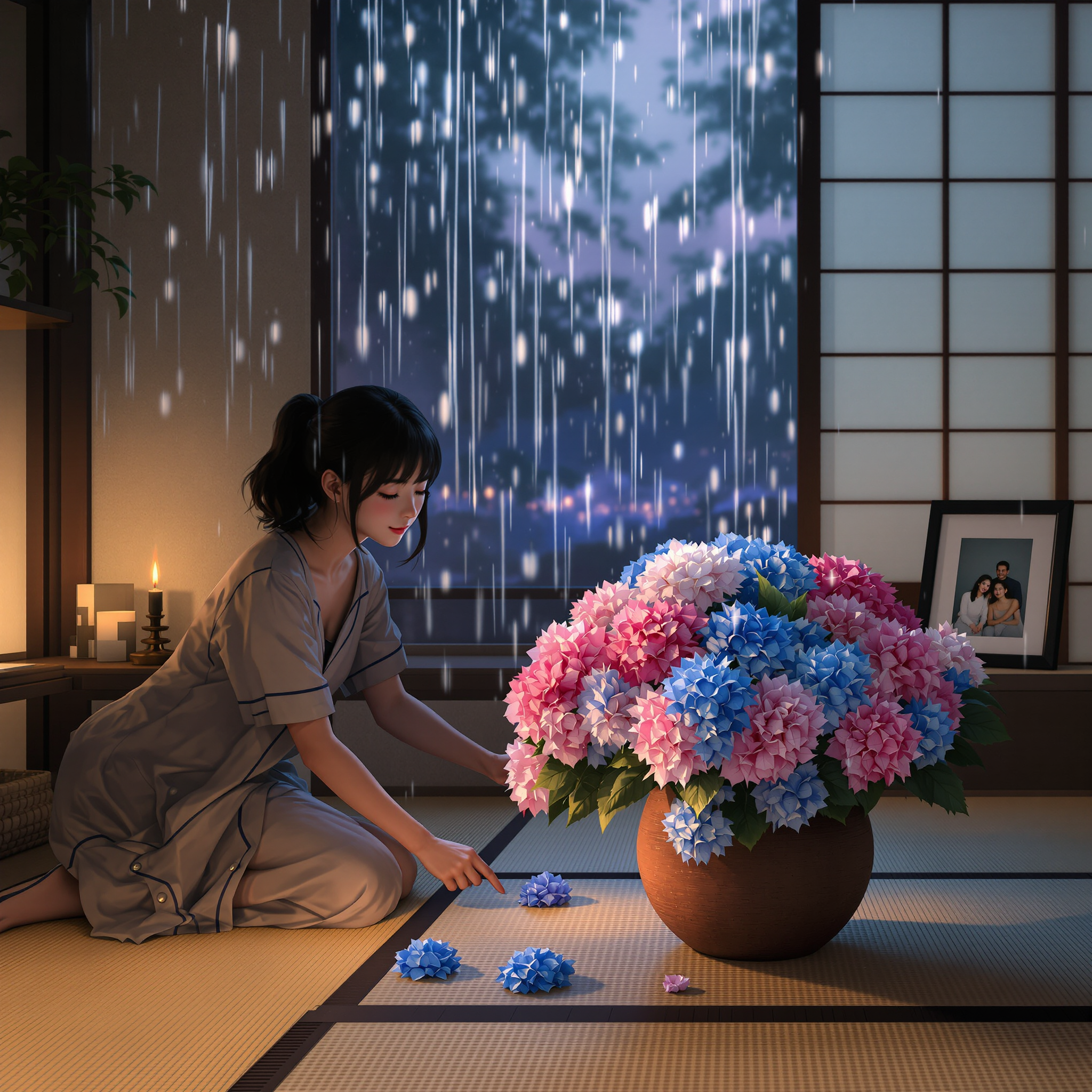The superstition asserts that a parent’s behavior, emotions, and even thoughts—particularly those of the mother during pregnancy—have a direct and lasting influence on the child’s character and future development. Cultural practice often includes advising expectant mothers to avoid fear, anger, or sadness and instead engage in calming activities or positive thinking. Some traditions also emphasize avoiding negative speech or actions around children, especially during certain developmental milestones. In some beliefs, this extends to sensory influences: listening to soothing music, viewing beauty, and maintaining positivity are all said to bless the child inwardly. The intended outcome is to raise a morally upright, mentally stable, and successful individual, protected from wayward tendencies or misfortune.
Daily Life Superstitions
This superstition advises individuals to maintain emotional composure on January 1st, the first day of the year, to avoid carrying sorrow or conflict into the coming months. Rooted in the belief that actions and emotions on New Year’s Day reflect and set the course for the rest of the year, families often strive for calm and positivity. Practitioners may avoid any disputes, arguments, or displays of sadness. Instead, households might emphasize harmony, generosity, and joyful interactions. The practice can influence how individuals plan their social engagements for the day—minimizing potentially stressful events and opting for peaceful family gatherings. Some people actively resist watching sad films or reading emotional news to preserve an uplifted mood. Emotional restraint, especially in relationships, is considered vital on this day.
This superstition advises people to avoid purchasing shoes on January 1st, as doing so is believed to bring hardship or instability throughout the year. The reasoning lies in a phonetic similarity: in some Chinese dialects, the word for ‘shoes’ (鞋, xié) resembles the word for ‘rough’ (邪, xié or 苦, kǔ), suggesting a rocky or troubled path. As a preventive measure, many will ensure they buy or replace footwear before the New Year begins. The superstition is strongest in cultural contexts where pun-based beliefs are significant, especially in parts of East and Southeast Asia. Adherents may also avoid gifting shoes for Lunar New Year, as this is thought to cause breakups or bad luck in relationships. In contrast to Western gift-giving norms, where shoes may be perceived as stylish or thoughtful, these traditions frame them as potentially inauspicious symbols of discord or hardship.
Many cultures consider hydrangeas more than ornamental plants. In specific Eastern traditions, particularly in parts of Japan and East Asia, placing hydrangeas in the home is said to restore emotional balance, mend broken relationships, and attract positive energy. The flower’s symmetrical shape and vibrant hues are symbolically tied to balance, empathy, and heartfelt emotion. Some superstitions suggest placing hydrangeas in common family areas, such as the living room or kitchen, to encourage cooperation and calm interpersonal tensions. In Feng Shui practices, the placement of hydrangeas is thought to enhance ‘qi’ or life energy, particularly when they are blue, a color associated with peace and communication. The flower’s abundance of petals also symbolizes prosperity and heartfelt gratitude, reinforcing its reputation as a charm for good domestic fortune.
This superstition dictates that dirt or debris inside a home should not be swept toward or outside the front door. Instead, one should sweep the dirt inwardly—often toward the center of the home—and then carry it out through the back door. The act is believed to trap and protect the household’s prosperity, harmony, and luck within the space. Sweeping out the front door is considered spiritually careless, symbolizing the removal of fortune, relationships, or success. In some variations, people also avoid sweeping after sundown or on New Year’s Day, fearing the symbolic loss of good omens. This belief is often observed as part of routine house cleaning practices, especially during cultural or spiritual holidays where maintaining purity and luck in the home is emphasized.
According to this superstition, presenting a decorative box or container as a gift should always involve placing at least a small token, coin, or keepsake inside. An empty box symbolizes emptiness, poverty, or lack of care for the recipient. Traditional interpretations suggest that the contents imbue the gift with good fortune, gratitude, or abundance. Even a small coin or sweet inside a box is considered sufficient to avoid negative consequences. This practice is sometimes followed during gift-giving occasions like weddings, birthdays, or holidays. In some beliefs, the box represents the person’s fortune or life—a void inside signifies a void in blessings or relationships. Thus, inserting even a token item signifies hope, richness, and thoughtfulness.
This superstition warns against gifting clocks, hourglasses, or other time-measuring devices. In cultures such as Chinese tradition, the word for ‘giving a clock’ (送钟 sòng zhōng) sounds nearly identical to the phrase for attending a funeral (送终 sòng zhōng), thus implying a symbolic gesture associated with death or finality. Giving a clock may undesirably symbolize ‘counting down’ the time remaining in someone’s life. The belief extends to other time-related gifts like watches or hourglasses, which may be seen as reminders of life’s transience or the approaching end. To avoid offense or bad luck, if a timepiece must be given, some people offer a symbolic payment in return (such as a small coin) to break the omen, converting it from a ‘gift’ to a ‘purchase.’
This superstition discourages men from growing mustaches due to the belief that facial hair—specifically a mustache—attracts bad luck, deteriorates one’s fortune, or interferes with personal harmony. It is sometimes associated with fears of vanity or moral laxity. The belief may also stem from cultural rituals or norms connecting clean-shaven faces with purity or honesty. In regions where this belief persists, men might shave regularly as a preventative measure, especially before important life events like weddings, job interviews, or public ceremonies, where luck and appearance are considered pivotal.
According to traditional Chinese superstition, used or second-hand objects—especially clothing, jewelry, or furniture—are thought to carry the energy (or ‘qi’) of their previous owner. If that person experienced tragedy, illness, or misfortune, it is believed that these spiritual residues could be transmitted to the new user. As a preventive measure, families may avoid second-hand purchases altogether or perform cleansing rituals (such as burning incense, exposing the item to sunlight, or using salt) to spiritually purify these objects before use. This belief extends most strongly to intimate or everyday items such as beds, shoes, and wedding dresses. In some cases, gifted used items are reluctantly accepted out of politeness but are not incorporated into the household. The custom reinforces values of pride, self-sufficiency, and maintaining positive energy within the home.
In many cultures, the broom is not just a household cleaning tool but a spiritual symbol tied to sweeping away negative energy. Striking a person with a broom, especially intentionally, is believed to transfer bad energy, disrupt spiritual balance, or ‘sweep away’ a person’s good luck. This belief warns against using household items, particularly those associated with cleansing, as instruments of violence. Some variations of the superstition say that if a person is accidentally touched by a broom, they must immediately spit on it or reverse the gesture by brushing themselves to undo the curse. The intention is to prevent the loss of fortune and peace associated with being symbolically ‘cleansed’ by force.









